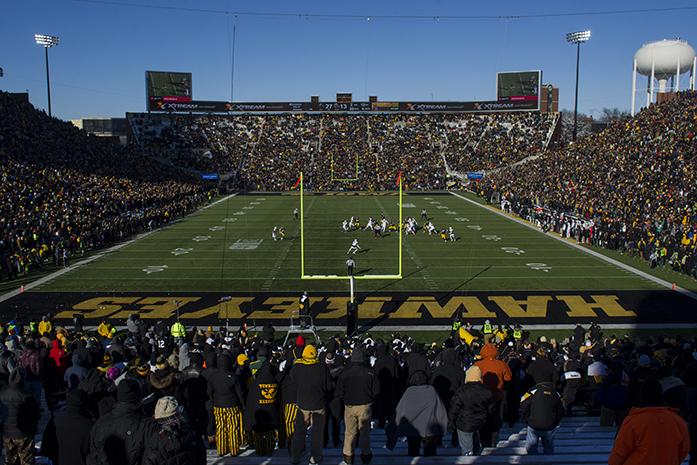By Austin Petroski
Manville Heights residents voiced their displeasure on Tuesday evening about the Iowa City City Council’s approval of the proposed Kinnick Stadium replica house at 101 Lusk Ave.
“We are here to express our concern to the public that city staff erroneously handled this situation and erroneously interpreted and applied City Code,” said Karin Southard, the president of the Manville Heights Neighborhood Association, at the council’s meeting.
The proposed Kinnick replica is considered by residents of the area to be nothing more than a “party house.” It would replace a demolished house in the West Side neighborhood.
“We were stunned to discover only by hearsay that the city was about to misclassify this very large party venue as a residence,” Southard said.
The house is planned to be a 7,500-square-foot building, with brick siding and a look-a-like press box to resemble Kinnick.
The City Council had previously approved the house at a recent council meeting. The council regarded the building as a single-family home, much to the ire of many neighborhood citizens.
A considerable number of the residents’ concerns regarded safety and drainage problems the area could face, owing to its location on a cul-de-sac and narrow residential street that is only partially paved.
“The infrastructure is as vintage as the charming early 1900s homes on the street,” Southard said.
She believes many property owners would be put at risk if the house were built, and she noted that 50 Manville Heights residents and community members rallied against the proposed house three weeks ago.
Many of the residents were concerned regarding the council’s lack of judgment on their behalf and hoped it would just be a momentary lapse.
“I am concerned whether the decisions are reflecting the council’s own values,” resident Gerard Rushton said.
James Larew, an attorney appointed by the organization to act for it in any legal action, voiced similar beliefs.
“Many residents are concerned there may be a breach of values and actions on those elected to serve,” he said.
Larew said many felt the strong emotions displayed by those should not come as a surprise to anyone.
“Reasonable expectations by property owners have been ignored,” he said.
Southard said the group believes negligence or money played a part in the approval of the building.
“We believe the application of City Code has been interpreted loosely or misinterpreted entirely to benefit outside forces with money and influence,” she said.
The owners of the house did not attend the meeting, and city councilors said they had been advised by their attorney not to comment on the matter and declined to comment for this story.



